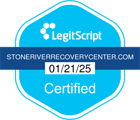Alcohol Addiction Treatment in San Antonio, Texas

About Alcohol Addiction
Are you ready to make a change and overcome your struggles with alcohol? If so, you’ve come to the right place. At Stone River Recovery Center in San Antonio, Texas, we understand the challenges of alcohol addiction and are here to provide you with the support and resources you need to start your journey towards sobriety.
Explore Alcohol Addiction & Treatment
Are you looking to take back your life?
(888) 235-3003
Treatment Paths
Our Programs
Understanding the Effects of Alcohol
Excessive alcohol consumption can have significant physical and mental health impacts. It is important to understand the consequences of prolonged alcohol abuse in order to make informed decisions about your health and seek appropriate help when needed.
Alcohol affects various organs in the body, including the brain, liver, heart, and immune system. In the short term, alcohol can impair judgment, coordination, and reaction time, increasing the risk of accidents and injuries. Prolonged alcohol abuse can lead to liver damage, increasing the risk of liver disease, cirrhosis, and even liver failure.
Furthermore, excessive alcohol consumption can have serious mental health consequences. Alcohol is a depressant that affects the brain’s neurotransmitters, leading to mood swings, anxiety, and depression. It can also impair memory and cognitive function, making it difficult to concentrate and perform daily tasks.
Long-term alcohol abuse can result in a range of physical health issues. It weakens the immune system, making individuals more susceptible to infections and diseases. Chronic alcohol use can also lead to cardiovascular problems, such as high blood pressure, irregular heartbeats, and an increased risk of heart disease and stroke.
Recognizing signs of alcohol addiction is crucial for early intervention and treatment. Some common signs include an increased tolerance to alcohol, withdrawal symptoms when attempting to quit, neglecting responsibilities, and experiencing cravings or strong urges to drink. If you or someone you know exhibits these signs, it may be an indication of alcohol addiction and seeking professional help is highly recommended.
Exploring Your Relationship with Alcohol
Assessing Your Drinking Habits and Patterns: Take some time to honestly evaluate how much and how often you drink. Keep track of the number of drinks you consume in a day, as well as the situations or emotions that may trigger your drinking. This self-reflection will help you gain a better understanding of your relationship with alcohol and the impact it has on your life.
Identifying Triggers and Underlying Reasons for Drinking: Triggers can be anything from stressful situations to social events or certain emotions. By recognizing these triggers, you can develop strategies to avoid or cope with them without turning to alcohol. Additionally, try to uncover the underlying reasons for your drinking. Are you using alcohol as a way to escape or numb certain feelings? Understanding the root causes of your drinking can help you address them more effectively.
Understanding the Emotional and Social Aspects of Alcohol Use: Alcohol often plays a role in our emotional and social lives. It can be used as a way to celebrate, relax, or socialize with others. Take the time to explore healthier coping mechanisms and alternative activities that can provide the same benefits without the negative consequences of alcohol. Building a strong support system of friends, family, or a support group can also help you navigate the emotional and social aspects of life without relying on alcohol.

Creating a Personalized Plan
When it comes to stopping drinking alcohol, creating a personalized plan is essential for success. By setting achievable goals, developing strategies to handle cravings and temptations, and finding healthy alternatives and coping mechanisms, you can take control of your journey towards sobriety.
Setting Achievable Goals: Start by identifying why you want to cut back or quit alcohol. Is it for your health, relationships, or personal growth? Once you have a clear motivation, set specific and realistic goals. For example, you could aim to reduce your alcohol consumption by a certain amount each week or commit to a specific number of alcohol-free days per week.
Handling Cravings and Temptations: Handling cravings and temptations can be challenging, but having strategies in place can help you stay on track. Identify your triggers and develop coping mechanisms to overcome them. This could include finding healthy distractions like engaging in physical activities, practicing relaxation techniques, or seeking support from friends, family, or support groups.
Finding Healthy Alternatives and Coping Mechanisms: It’s crucial to find healthy alternatives and coping mechanisms to replace alcohol. Explore new hobbies or activities that bring you joy and fulfillment. Engage in regular exercise, which can boost your mood and help reduce cravings. Consider seeking professional help from a sobriety center, where trained experts can guide you through the process and provide the necessary support and resources.

Seeking Support and Assistance
When it comes to stopping drinking alcohol, seeking outside support and assistance is essential for a successful recovery journey.
Understanding the Importance of Professional Help: Breaking free from alcohol addiction requires expert guidance and support. Professional help can come in various forms, such as counseling, therapy, or treatment programs. These professionals have the knowledge and experience to address the underlying causes of addiction and provide effective strategies for overcoming it. They can also offer emotional support and help you develop healthy coping mechanisms to replace alcohol.
Exploring Available Resources and Treatment Options: There are numerous resources and treatment options available to individuals seeking to stop drinking alcohol. From outpatient treatment to residential programs, such as our 30 day treatment program, our dedicated team of professionals will guide you through every step of your recovery journey. Additionally, there are support groups, online forums, and helplines that can provide valuable information, encouragement, and guidance.
Building a Support Network of Friends and Family: Having a strong support network is crucial during the process of quitting alcohol. Reach out to friends and family members who are understanding and supportive of your decision to stop drinking. Surround yourself with positive influences who can offer encouragement, accountability, and understanding. Communicate your goals and struggles with them, and lean on them during challenging times. Their support can make a significant difference in your recovery.
Building a New Lifestyle
When it comes to overcoming alcohol addiction, building a new lifestyle is crucial. By making positive changes to your routine and environment, engaging in healthy activities to replace alcohol consumption, and maintaining motivation while celebrating milestones, you can create a fulfilling and sober life.
Making Positive Changes to Your Routine and Environment: One of the first steps in building a new lifestyle is making positive changes to your routine and environment. Identify triggers that may lead to drinking and find ways to avoid or cope with them. Consider changing your daily habits, such as finding new hobbies or joining support groups, to create a healthier and alcohol-free lifestyle.
Engaging in Healthy Activities: Engaging in healthy activities is another important aspect of building a new lifestyle. Find activities that you enjoy and that help you relax and de-stress. Exercise regularly to release endorphins and improve your overall well-being. Explore new hobbies, such as painting, hiking, or playing a musical instrument, to fill your time and keep your mind occupied.
Maintaining Motivation and Celebrating Milestones: Set achievable goals for yourself and celebrate milestones along the way. Whether it’s a week, a month, or a year of sobriety, acknowledge your progress and reward yourself with something meaningful, like a spa day or a weekend getaway.
Building a new lifestyle takes time and effort, but it is a worthwhile endeavor. By making positive changes to your routine and environment, engaging in healthy activities, and staying motivated, you can successfully stop drinking alcohol and create a fulfilling life in sobriety.


